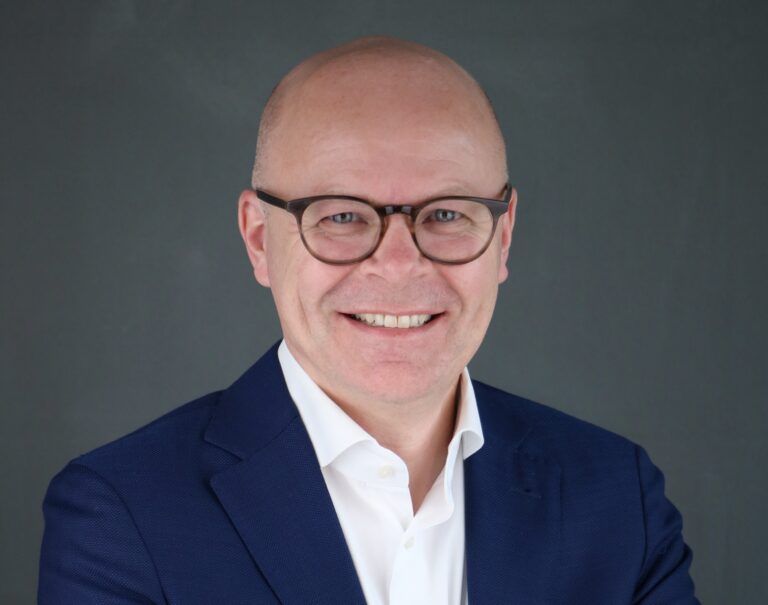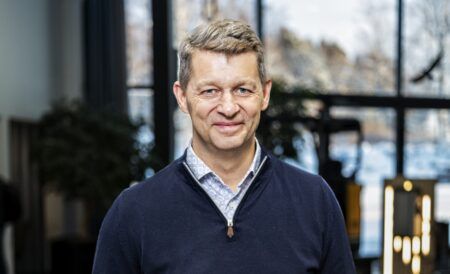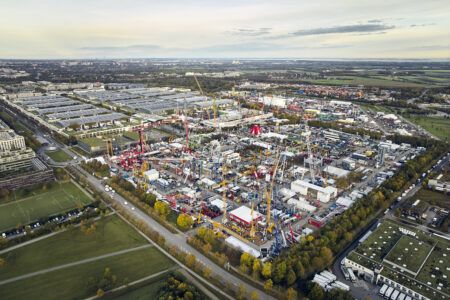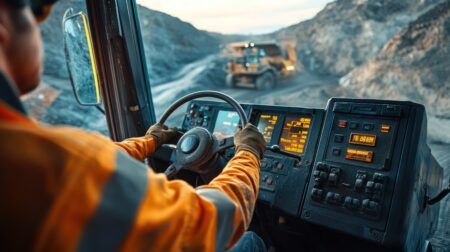Volvo CE’s new head of technology Mats Sköldberg gives insight into the OEM’s direction on electrification, alternative fuels and end-to-end decarbonization – as well as recounting inspirational moments from his life and career so far
Growing up on a cattle farm, little Mats Sköldberg was transfixed by the gigantic tractors glistening and steaming in the bright Scandinavian morning of his youth. Volvo at that time was moving away from its roots in building agricultural vehicles, but construction machines were a pretty good second – and the Sköldberg farm was a stone’s throw from Eskilstuna, where Volvo was, and still is, based.
“Going through school, I was interested in product development,” Sköldberg recalls. “I started as a mechanic in the hydraulic lab of what is Volvo CE today. After university, I returned as a hydraulic engineer, then became a chief engineer. I used to say I wasn’t a great engineer, but the complete machine and its applications was where I had my passion.”
Sköldberg was responsible for wheel loader development over a 12-year period and oversaw the ground-up redesign process which endowed Volvo CE’s E-Series machines with improved comfort, fuel-economy and productivity. Following a decade in China (more of that later), he returned to Eskilstuna as the OEM’s new head of technology in September 2023.
“Being in Volvo CE my whole career, I think it’s quite clear where we are aiming,” he says. “Of course, that journey concerns sustainable powertrain, electrification and sustainable fuels. There’s also how we use data and connectivity, not only for services, but also internally to improve our products. Then there’s autonomy and operator assistance, helping customers improve their productivity.”
Electric leaders
Volvo CE’s position on electrification is one of market leadership. Since developing its first all-electric compact excavators and wheel loaders at the end of the last decade, it has produced a succession of electric machines, most recently the L90 and L120 wheel loaders and EWR150 excavator. Yet electric machines today account for only a fraction of the 35% of total sales Volvo CE aspires to.
“It’s low in percentage, but that is how it must start,” says Sköldberg. “Getting machines out gives us something to build on. Because simply making an electric wheel loader isn’t enough. We have to create an ecosystem around it, learning together with partners and customers in the process.”
The Electric Site project in 2018 demonstrated the feasibility of zero-emissions construction on a real-world site project-managed by Sköldberg in the City of Gothenburg. It found that electric machines matched the performance of diesel counterparts and created positive benefits for operators, whilst mapping the digital solutions, charging or cable-management infrastructure and business conditions needed to support them.
“It’s super-important to show this transformation is possible,” says Sköldberg. “Demonstrations provide a learning ground and create partnerships to supply the solutions and equipment which mean it makes sense for customers to invest in electrification. When we cooperate, we can accelerate – and seeing so many companies driving in the same direction makes me confident we will get there.”
Volvo CE uses lithium nickel manganese cobalt oxide (LMC), lithium nickel cobalt aluminium oxides (NMC) or lithium iron phosphate (LFP) battery technologies for different applications. While improvements in battery power and life are a long way off matching those seen in computer processing power over the past 50 years (with Moore’s Law showing a doubling every two years) advances are being made.
“Chemistries and packing technology are evolving to improve performance and reduce cost,” says Sköldberg. “If you take a two-year view, it isn’t game-changing, but over five or 10 years it could be. Today, different chemistries are better for different products and applications, but what those chemistries will be in five years’ time, we need to learn and explore.”
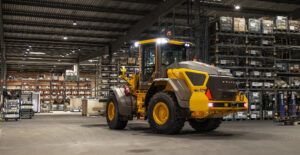
“Simply making an electric wheel loader isn’t enough. We have to create an ecosystem around it”
Chinese takeaways
After years developing wheel loaders, Sköldberg was given the opportunity to become Volvo CE’s vice-president of technology in China, which represents the world’s largest wheel loader market. His defining achievement was establishing the Jinan Technology Centre in Shangdong Province, dedicated to developing products and components for emerging markets, which opened in 2014.
“Setting up an R&D centre was a once-in-a-lifetime opportunity,” he says. “Initially, I planned to go for two years, which ended up being 10. Living as a foreigner in the so-called expat bubble of Shanghai is quite easy. When you move abroad, you learn a lot about yourself and see your own country in a different light.”
Sköldberg also learned a lot about the Chinese market, now among Volvo CE’s largest, where it produces machines under both its Volvo and Shandong Lingong Construction Machinery (SDLG) brands. These insights should help Volvo CE continue adapting to
a market with different operating standards and rapid development cycles where value is paramount.
“In China, the pace is different,” he says. “Efficient supply-chains and an appetite for technology mean you must come to market and update products more quickly. China is good at digitalization and battery technology. Electrification is moving quickly there, with potential to leapfrog other markets.”
Learning in the real world
Volvo CE works closely with municipalities like the City of Hanover in Germany to support their aspirations for zero-emissions transformation. For Sköldberg, this a two-way learning process which involves understanding the needs and vision of cities as much as selling them machines.
“Cities are important, because they often take the first steps towards zero-emission solutions,” he says. “They are also a customer to our customers, so understanding their vision means we can be prepared for their requirements.’
But does it concern Sköldberg at all that a period of political turbulence in both Europe and the US could yield governance that is less forward-thinking on environmental questions?
“We can discuss the pace, but transformation will happen because it has to,” he replies. “It would be beneficial if countries could align with their aims and all act together. They probably won’t, but our course is consistent, because the question is not if, but when. We foresee selling diesel machines for a while yet, but want the transformation to happen as soon as possible. For local municipalities, it still seems to be high on the agenda.”
Sköldberg joined Volvo in 1993 and, while the fantastic procession of tractors which peopled his boyhood have long since passed into memory, he remains with the company today. Such have been the opportunities to grow and travel and learn and create that he never got round to leaving. Back where he started in Eskilstuna, perhaps he never will.
“Nobody stays that long unless a company’s values really resonate with one’s own,” he says. “Our core values of safety, sustainability and quality sit comfortably with me. We trust and listen to each other – that open culture has helped the company survive nearly 200 years.”
This article was first published in the August issue of iVT International – https://markallen.mydigitalpublication.co.uk/publication/?m=63192&i=827328&p=1&pre=1&ver=html5


